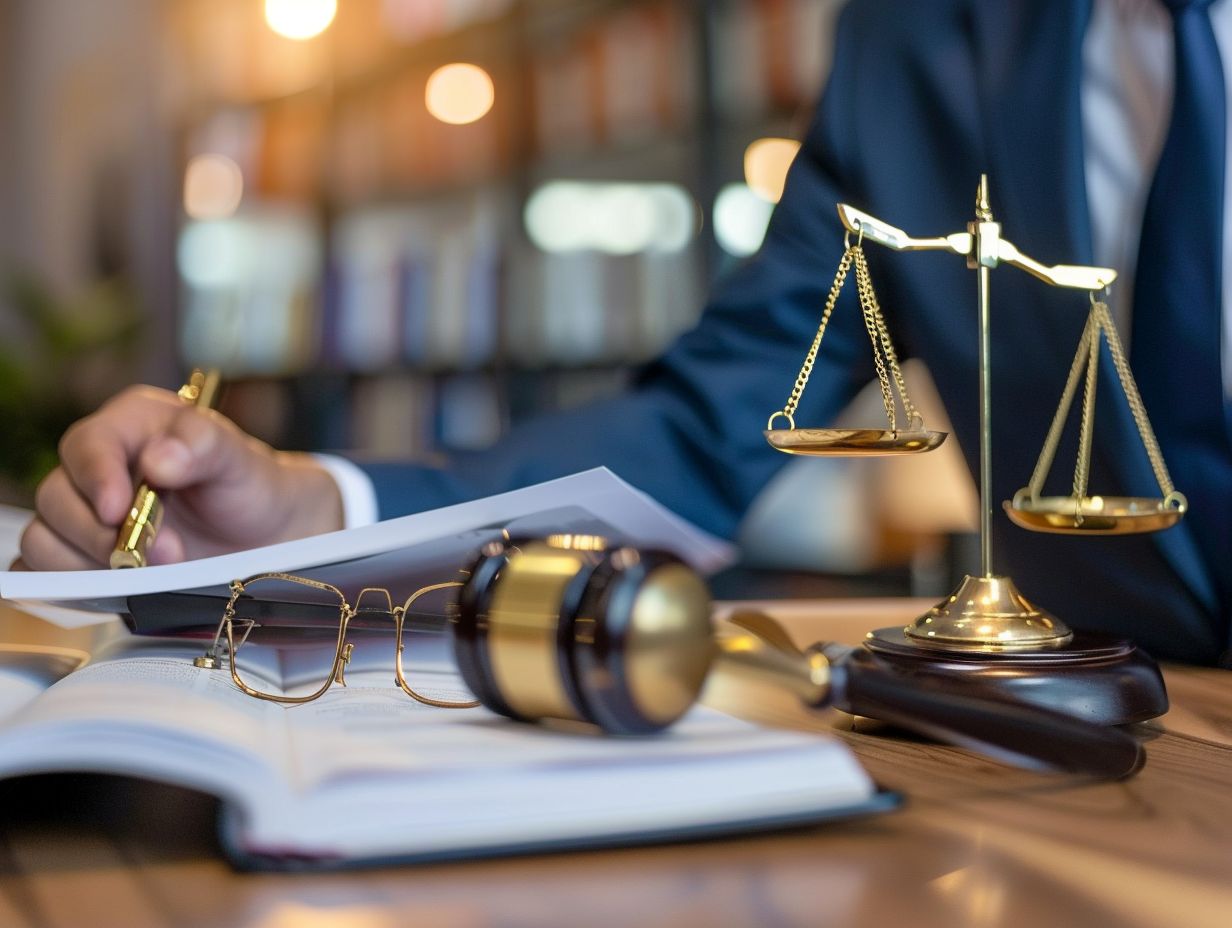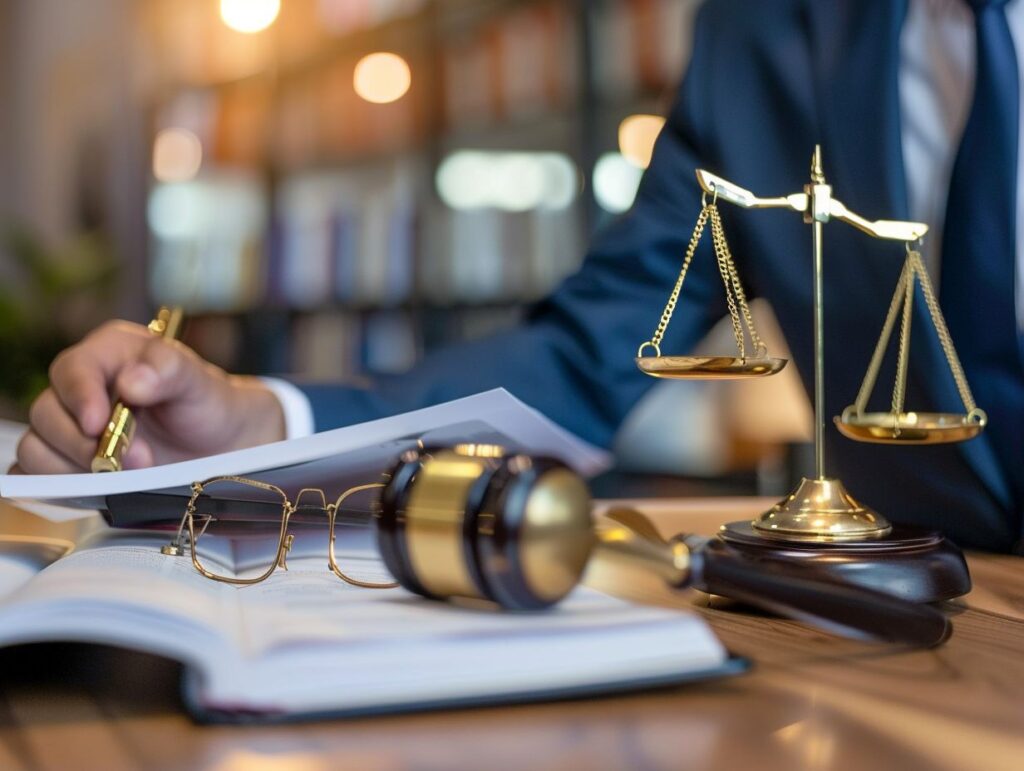Are you in the market for a real estate lawyer in Florida but unsure of where to start? Look no further!
We will discuss the qualities to look for in a real estate lawyer, the experience and credentials they should possess, as well as their reputation.
Also, we’ll provide you with a list of questions to ask before hiring, red flags to watch out for, and the benefits of hiring a real estate lawyer in the Sunshine State.
Let’s dive in and find the perfect legal representation for your real estate needs.
Key Takeaways:

- Choose a real estate lawyer with strong qualities, experience, credentials, and reputation.
- Ask important questions about experience, fees, references, and communication before hiring a real estate lawyer.
- Beware of red flags like unrealistic promises, unresponsiveness, lack of experience, and unprofessional behavior when selecting a real estate lawyer.
How to Choose a Real Estate Lawyer in Florida?
Selecting a real estate lawyer in Florida requires taking into account various important factors, such as the attorney’s expertise in real estate law, their membership in local bar associations, and their overall experience in managing a range of real estate issues to safeguard your legal and financial interests.
What Are the Qualities to Look for in a Real Estate Lawyer?
Important factors to consider when selecting a real estate lawyer include a significant amount of experience, effective negotiation abilities, and expertise in alternative dispute resolution techniques like mediation and arbitration.
Experience is vital as it enables the lawyer to handle intricate real estate deals and predict potential conflicts. Strong negotiation skills are necessary for securing positive results for clients in property transaction negotiations.
Proficiency in alternative dispute resolution methods such as mediation and arbitration is advantageous as they provide efficient and cost-effective ways to address disputes without lengthy legal proceedings, ultimately saving time and money for clients and preserving positive attorney-client relations.
What Experience Should a Real Estate Lawyer Have?
A real estate lawyer should have a balanced experience in both transactional and litigation aspects, including handling complex cases involving real estate disputes.
Having proficiency in transactional real estate work is essential for drafting contracts, negotiating deals, and ensuring smooth property transactions.
On the other hand, litigation experience is crucial when disputes arise, such as boundary disputes, breach of contract, or lease disagreements.
By possessing expertise in both transactional and litigation areas, a real estate lawyer can provide comprehensive legal guidance and representation to clients throughout the various stages of real estate dealings. This dual expertise equips them to anticipate potential conflicts and effectively resolve them through negotiation or in court, ensuring favorable outcomes for their clients.
What Credentials Should a Real Estate Lawyer Have?
The qualifications for a real estate lawyer typically involve membership in local bar associations, specialization in real estate law, and adherence to attorney ethics rules.
These qualifications are important in demonstrating to clients a lawyer’s competency and dedication to the legal standards that govern real estate transactions. Membership in local bar associations indicates that the lawyer is part of a professional network, continuously updating their skills and knowledge to provide effective service to clients.
Specialisation real estate law highlights a thorough understanding of property transactions, ensuring that clients receive targeted and informed assistance in real estate matters. Adhering to attorney ethics rules further assures clients of the lawyer’s professionalism and ethical behavior in their legal practice.
What Is the Reputation of the Real Estate Lawyer?
The reputation of a real estate lawyer is typically assessed through referrals from previous clients and their status within bar associations.
One can also review online testimonials and comments about the lawyer to understand their professionalism and performance record. Additionally, checking for any disciplinary actions or complaints filed against the lawyer with state bar associations can help gauge their reputation. Consulting with legal experts or seeking referrals from other lawyers can offer valuable insights into a lawyer’s standing within the legal community.
What Questions Should You Ask a Real Estate Lawyer Before Hiring?
Ahead of hiring a real estate lawyer, it is important to inquire about their experience, fee structure, any guarantees on outcomes, and the specifics of the retainer agreement to ensure a comprehensive understanding of what to anticipate.
What Is Your Experience in Real Estate Law?
When inquiring about a real estate professional’s experience, it is important to ask about the types of cases they have handled, particularly those involving both commercial and residential buyers. This helps ensure they possess a well-rounded background in real estate disputes.
Having a diverse range of experience in handling various real estate transactions and disputes is essential for real estate professionals. This varied experience enables them to navigate the complexities that can arise in both commercial and residential deals.
Understanding the specific nuances of each transaction type provides them with the necessary knowledge and expertise to effectively represent clients in negotiations and legal proceedings. With a broad spectrum of experience, professionals are better equipped to offer comprehensive solutions customized to meet the individual needs of each client, leading to more successful outcomes in real estate matters.
How Do You Charge for Your Services?
It is important to understand how a lawyer charges for their services. Inquire about their fee structure, whether they operate on an hourly rate or a flat fee basis, and the specific details of the retainer agreement.
Clients should also ask about any additional costs that might arise during the legal process, such as court fees, travel expenses, or administrative charges. Reviewing the retainer agreement carefully is crucial to comprehend how and when these additional fees may be invoiced.
Look for clauses that specify the frequency of billing statements and whether there are any expense limits. Effective communication and transparency regarding fees can help prevent unexpected surprises in the future.
How Do You Communicate with Clients?
It is crucial in an attorney-client relationship to inquire about the methods they use to keep clients informed and their responsiveness to client inquiries.
Regular updates and timely communication are key components that contribute to the development of a strong connection between a client and their legal counsel.
By staying up-to-date on the status of your case and promptly addressing any issues or questions, the attorney showcases their commitment to your legal concerns and ensures that you are kept informed throughout the process. This transparent communication not only builds trust but also facilitates a seamless and productive partnership in working towards your legal objectives.
What Are the Red Flags to Watch Out for When Choosing a Real Estate Lawyer?
When selecting a real estate lawyer, it is important to be mindful of warning signs like unrealistic promises, lack of responsiveness in communication, insufficient experience in real estate law, and unprofessional conduct, as these factors can have a substantial impact on the result of your case.
Unrealistic Promises
It is advisable to be cautious of lawyers who make unrealistic promises or guarantee specific outcomes, as this behavior may indicate overconfidence and could potentially put your legal rights at risk.
Instead, it is recommended to seek attorneys who offer realistic assessments of your case, outlining potential outcomes based on their experience and expertise. It is important to recognize that the legal process can be unpredictable, and any lawyer who claims guaranteed success may not be trustworthy.
To assess a lawyer’s integrity, observe their transparency in communication, willingness to address your inquiries, and track record of effectively managing expectations. A reliable attorney will openly discuss the potential challenges and risks associated with your case, establishing realistic expectations from the outset.
Unresponsive Communication
Unresponsive communication can serve as a significant warning sign, suggesting potential challenges in maintaining a dependable attorney-client relationship.
It is essential for individuals involved in legal matters to receive timely and clear updates from their legal representatives. Without prompt communication, important information may go unnoticed, deadlines could be missed, and misunderstandings might occur. This lack of openness can impede the progression of the case and create additional stress and uncertainty for the involved party.
Effective communication forms the foundation of a successful partnership between a client and their attorney, ensuring that both sides are in alignment and striving towards a shared objective.
Lack of Experience in Real Estate Law
A lack of experience in real estate law can hinder the effective resolution of real estate disputes, so it is important to ensure that your lawyer possesses the necessary specialization.
This specialized experience guarantees that your lawyer is well-versed in the intricacies and complexities of real estate transactions, allowing them to offer you the most precise and effective legal advice. One useful resource for verifying a lawyer’s credentials in real estate law is the Florida Realtors Legal Hotline.
By seeking guidance from this hotline, you can gain insights into your lawyer’s expertise and experience in handling real estate issues, which can instill confidence in their ability to competently represent your interests.
Unprofessional Behavior
Unprofessional behavior that violates attorney ethics rules and affects reputation is an important red flag to consider when selecting a real estate lawyer.
Some common types of unprofessional behavior to be aware of include conflicts of interest, lack of communication or transparency, mishandling of client funds, and failure to maintain confidentiality. Bar associations have a crucial role in identifying ethical violations by establishing and enforcing standards, offering ethics training programs, and providing a mechanism for clients to report misconduct.
By verifying any disciplinary actions or complaints against a lawyer with the relevant bar association, individuals can protect themselves from potential risks and ensure they are engaging with a reputable legal professional.
What Are the Benefits of Hiring a Real Estate Lawyer in Florida?
Employing the services of a real estate lawyer in Florida provides various advantages, including safeguarding your legal rights and financial interests, offering expert advice during intricate real estate transactions, and efficiently resolving real estate conflicts.
Expertise in Local Real Estate Laws
Proficiency in local real estate laws in Florida is essential as it ensures the lawyer’s expertise matches the state’s particular legal criteria. Understanding the nuances of these laws can assist in preventing possible legal issues during property transactions.
By keeping informed about zoning regulations, property tax laws, and disclosure requirements, professionals can assist clients through a seamless and compliant process. Adhering to local laws not only protects against legal action but also boosts the legitimacy of the real estate transaction.
A solid understanding of Florida’s legal environment allows practitioners to navigate complexities effectively and offer customized solutions to their clients.
Negotiation Skills
A real estate lawyer’s negotiation skills are essential for drafting contracts and resolving disputes through mediation or arbitration. These skills are crucial in securing favorable terms and conditions for clients in real estate transactions. Effective communication and advocacy on behalf of clients help lawyers achieve positive outcomes while upholding professional relationships with other involved parties.
Strong negotiation abilities are also beneficial when dealing with intricate legal issues and reaching fair agreements. Analyzing market trends and legal requirements allows lawyers to offer strategic advice and make informed choices during negotiations.
Protection of Your Legal Rights
Ensuring the protection of legal rights during real estate transactions and disputes is a primary advantage of enlisting the services of a proficient real estate attorney. Having a knowledgeable legal representative by one’s side can guarantee the safeguarding of one’s interests and the comprehensive addressing of all legal aspects of the procedure.
A robust attorney-client relationship plays a crucial role in maneuvering through intricate real estate issues, as it facilitates transparent communication, personalized guidance, and customized legal strategies. The attorney’s expertise can offer insights on contractual commitments, property entitlements, and potential liabilities, enabling well-considered choices and efficient representation.
By partnering with a dependable legal counsel, one can have assurance that their rights are upheld and their best interests are given precedence throughout the entire legal process.
Prevention of Costly Mistakes
A real estate lawyer plays a crucial role in preventing costly mistakes that may compromise an individual’s legal rights and financial interests.
One common mistake seen in real estate transactions is the oversight of essential details in contracts, which can lead to misunderstandings or disputes in the future. Partnering with a lawyer can ensure that all legal documents are meticulously reviewed and explained, reducing the chances of misinterpretation.
Failing to carry out comprehensive due diligence on a property can lead to unforeseen issues after the purchase, such as zoning violations or undisclosed liens. Leveraging a lawyer’s expertise in scrutinizing property records can help identify potential concerns and protect individuals from buying a property with concealed problems.
Frequently Asked Questions
How do I choose a real estate lawyer in Florida?
To choose a real estate lawyer in Florida, you should first do some research on the lawyers in your area. Look at their experience, education, and reviews from past clients. You should also consider their fees and availability to work on your case.
What qualifications should I look for in a real estate lawyer in Florida?
You should look for a real estate lawyer in Florida who has experience in handling real estate transactions, has a law degree from an accredited institution, and is licensed to practice law in Florida. You may also want to consider their track record and success rate in handling cases similar to yours.
Is it necessary to hire a real estate lawyer for a transaction in Florida?
While it is not always legally required to hire a real estate lawyer for a transaction in Florida, it is highly recommended. A real estate lawyer can provide valuable legal advice and ensure that all necessary paperwork is properly completed to protect your interests.
Can I use a general lawyer for my real estate needs in Florida?
While some general lawyers may have knowledge and experience in real estate law, it is best to hire a lawyer who specializes in real estate law specifically. They will have a better understanding of the intricacies of real estate transactions and can provide more specialized and effective legal representation.
What questions should I ask a potential real estate lawyer in Florida?
Some important questions to ask a potential real estate lawyer in Florida include: How many years of experience do you have in real estate law? Have you handled cases similar to mine before? How do you charge for your services? Can you provide references from past clients? These questions can help you determine if the lawyer is a good fit for your needs.
How much does a real estate lawyer in Florida typically cost?
The cost of a real estate lawyer in Florida can vary depending on factors such as the complexity of the case, the lawyer’s experience and reputation, and the location. Some lawyers may charge a flat fee for their services, while others may charge an hourly rate. It is important to discuss fees with the lawyer before hiring them to ensure you understand the cost and can budget accordingly.


























Rate this article:
Average rating 0 / 5. Vote count: 0
No votes so far! Be the first to rate this post.
No Comments yet!